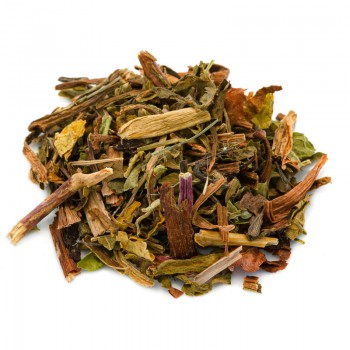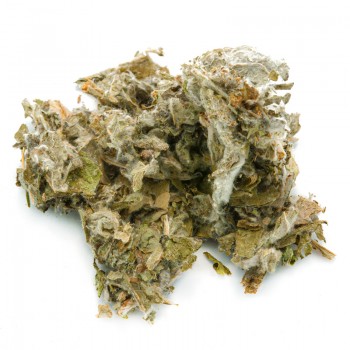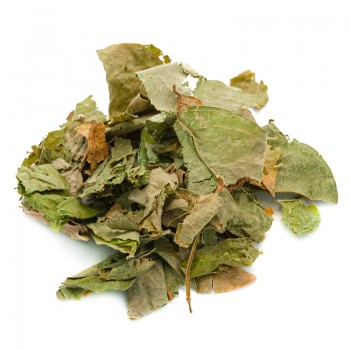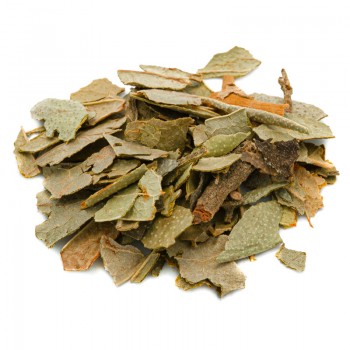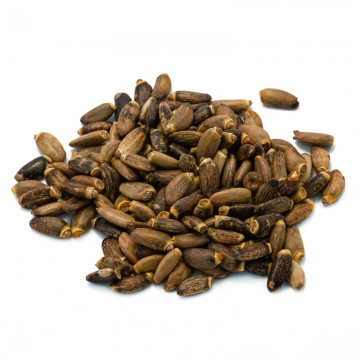Chicory root is highly appreciated in herbal medicine, being a rich source of the water-soluble vegetable fiber called inulin. This powerful prebiotic feeds the good bacteria in the gut and tends to lower the acidity level of the body.
Chicory root: properties and benefits
Prized for its earthy flavor, chicory root is linked to a variety of health benefits. First of all, the ability to relieve digestive problems: inulin helps to deal with heartburn, acid reflux and indigestion.
Chicory root also has prebiotic qualities, since it feeds the good bacteria of the intestine, thus promoting digestive health.
We know that chicory root gives considerable fiber, which increases the sense of satiety - sometimes diet bars, in fact, contain chicory.
The fibers contained in the chicory root help a healthy digestion, and also give excellent effects to counteract constipation. For this reason, the root in herbal tea cut is also assimilated to a laxative food.
The purgative qualities are always due to the inulin present in the chicory root, which favors the peristaltic movement and the secretion of gastric juice for regular and better bowel movements. By improving the digestive process, it reduces constipation problems - as well as counteracting colon irritation and flatulence.
The inulin present in chicory is also seen as beneficial for the reduction of bad cholesterol levels (LDL), which is harmful to our cardiovascular health. In addition, chicory is loaded with plant phenols, known to be natural agents that are beneficial for blood circulation.
Promotes healthy liver function, detoxifying the liver and protecting it from free radicals through its natural antioxidants. The beneficial properties of chicory on the liver and biliary tract derive from chicoric acid, a substance that promotes the secretion of bile and diuresis, with positive effects also on water retention and cellulite.
The herbal tea with chicory root, in fact, has diuretic properties that facilitate the elimination of toxins , which the body tends to store in the liver and in the kidneys.
For this, among the other benefits for the well-being of the organism provided by the chicory root, its beneficial capacity against kidney stones is included.
Chicory root also contains beneficial elements for the brain, such as manganese and vitamin B6. It is also considered a natural sedative and chicory root extract is considered a remedy for problems due to its sedative qualities.
For some time the studies on chicory root have been oriented towards understanding what beneficial effects it can have on sugar metabolism. Chicory appears to offer benefits to people at risk of diabetes by improving the stability of glucose and calcium in the blood.
Origins and History of cultivation
Chicory is a plant native to Europe, formerly also present in western Asia and northern Africa. Today it is widespread all over the world, known for growing on roadsides, and in different types of soils.
Each part of the plant has been considered beneficial in herbal medicine, as its shoots, roots and leaves have certain exploitable characteristics.
In some territories, including Italy, chicory leaves are assimilated to spinach leaves, for food use.
Chicory roots are usually ground into powder, or can be found on the market in herbal tea cut. For centuries they have been a remedy for the treatment of some pathologies. Chicory has been used as a medicinal herb since ancient times, and the Egyptians already used chicory as a means of detoxifying the blood and liver. It is mentioned in an ancient papyrus about 1500 years before Christ.
It is precisely from the Egyptian language that it derives, perhaps, its name (Kichorion), or perhaps from Arabic (Chikouryeh).
Even the ancient Greeks defined the plant kichòria, and in any case it had already been widespread for centuries in ancient cultures. Among the Romans it is Pliny the Elder who cites it as a plant known in Egypt, and Galen advised it for curare the liver.
For many centuries chicory has also been used to make compresses on inflamed parts, for swelling or arthritis.
The smooth and creamy taste, very similar to fat but with fewer calories, has always made it a substitute for fat such as margarine or other condiments. The extracts of chicory roots, containing insulin, are used today in the food industry: in ice cream, in protein shakes, in low-fat yogurts. In some baked goods, chicory root can also act as a gluten substitute.
Chicory root has historically been used as a substitute for coffee, because it tastes and looks similar.
Plant and flowers
The Cichorium intybus plant is a perennial herb belonging to the Asteraceae family.
It grows to about 120cm in height. It produces erect, almost leafless stems adorned with many light blue (sometimes pink or white) flowers, about 2.5 cm in size.
Blooms from late spring to fall, attractive flowers open in the morning and close later in the day.
Cichorium intybus has a large fleshy root, which exudes a milky sap when cut. Chicory has a long tradition in its herbal use, and the plant has been cultivated for centuries for its thick leaves or roots.
The young leaves can be eaten raw or cooked, while the roots are used as a coffee substitute or to flavor soups, sauces and gravies. Furthermore, we know that chicory infusions and decoctions have been used for centuries as a natural medicinal remedy.
This plant can be a weed, grows best in full sun, tolerates drought. It grows in medium moisture and well-drained soils and is a good choice for home gardens.
There are many varieties of chicory, although some are grown for the leaves rather than the roots.
Nutritional values of the chicory root
Regarding the nutritional value of chicory, we know that it is a source of various vitamins and minerals, which include iron, calcium, zinc, potassium, manganese and magnesium.
In terms of vitamins, chicory is known to contain vitamin A, vitamin E, folate, vitamin C and vitamin B6.
Among the other essential nutrients responsible for the health benefits of chicory, there are also macro and trace elements such as tannins, tars, phenols, organic acids, coumarins, pectin and the already cited inulin. Provides low calories and fat.
How to use Chicory root in herbal tea
The infusion of Chicory formed by the herbal tea cut root, is obtained by putting about 3-5 grams of the root in a cup (250 ml), with water at 100 ° C.
Leave to infuse for 5 to 8 minutes, before drinking the herbal tea.
Add honey or sugar if desired.
Chicory root has an earthy or woody flavor, similar to coffee and contains no caffeine.
Chicory Root: side effects and contraindications
Chicory is probably safe as a root when consumed in moderate quantities. It is generally well tolerated, but you need to know that it could cause symptoms such as flatulence, belching, abdominal pain, bowel sounds and bloating.
Research has not yet established the safety of chicory root for pregnant women, so avoiding chicory root during pregnancy is not recommended.
It is considered a root contraindicated in case of gastritis or peptic ulcer .
In the case of cross reactions, if you are allergic to birch pollen, you may have a reaction to chicory.

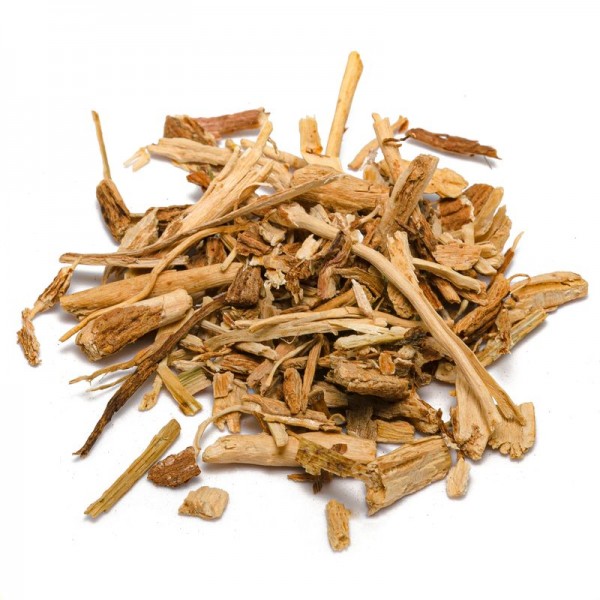









 No reward points for this product.
No reward points for this product.

